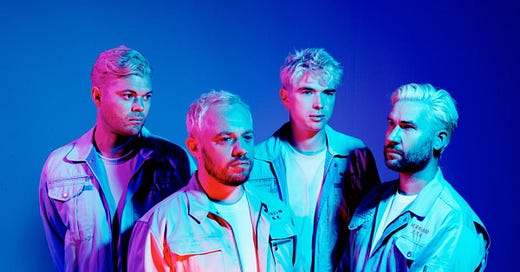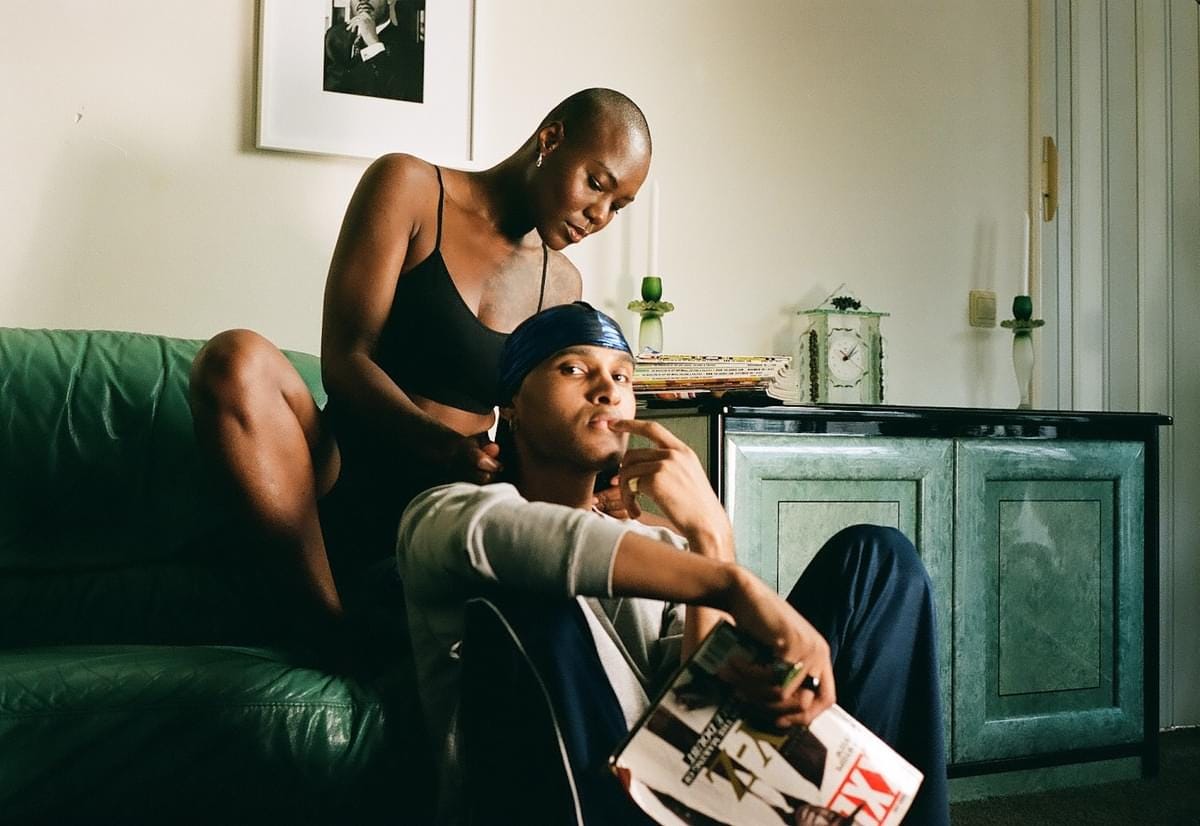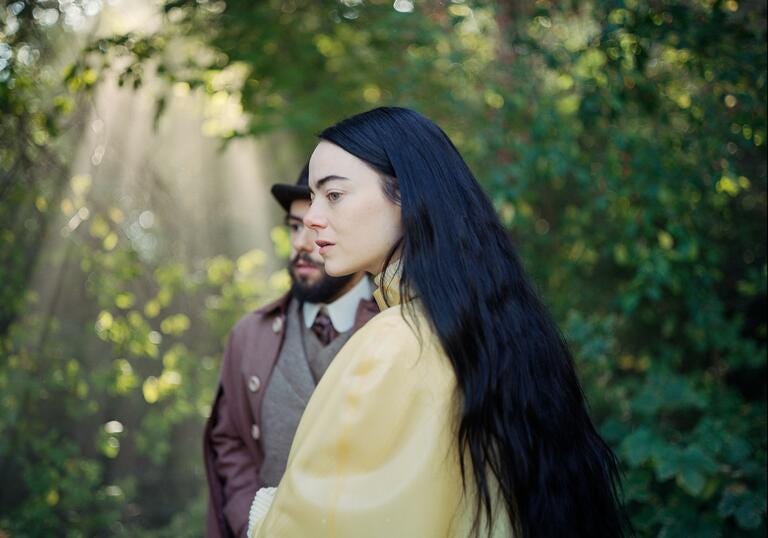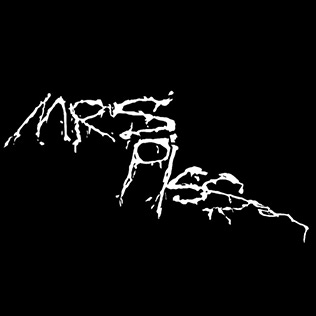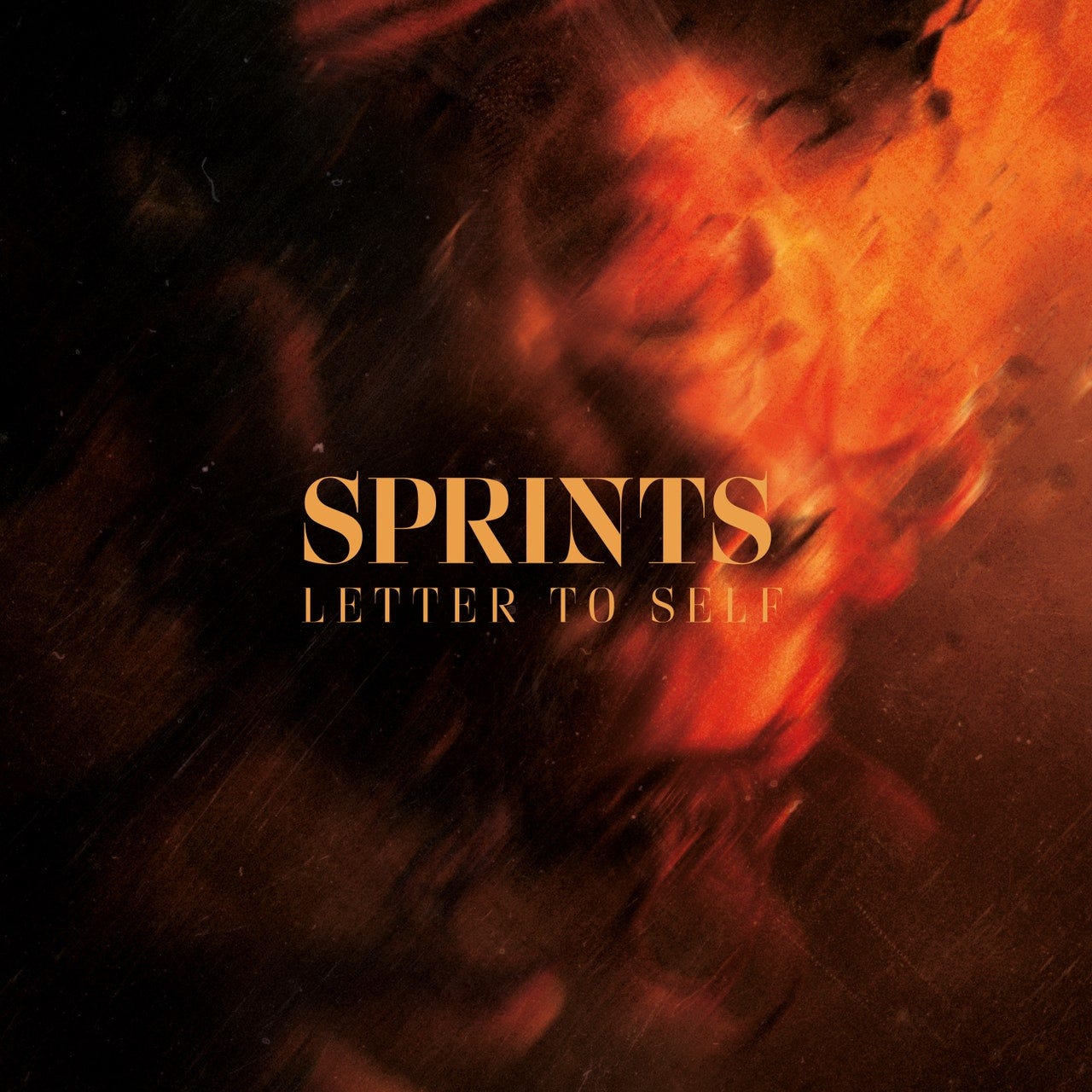The Friday Dispatch
Everything Everything, A Boy Named ROSA, Avril Lavigne, Mrs Piss, and Sprints
The entropy of Everything Everything
A few months ago, YouTuber Like Stories of Old released a video essay on The Marvelisation of Cinema. A meditation on the increasingly self-referential nature of the Marvel Cinematic Universe, it theorised that, as franchises produce film after film, they get further and further away from what made them special in the first place. “And that’s what happens to bands,“ Jonathan Higgs – frontman of Everything Everything – tells me.
He’s referring to the entropic slide these franchises often take. “As I was watching, I was thinking, 'This is why Oasis came out the blocks so strong – because it was so pure.’ They could never get that back. Everything that they did additionally just made it worse.”
Higgs himself is almost 17 years deep into a band of similar experience, if not similar notoriety – and they haven’t even had an intra-band punch-up to keep things interesting. How, I ask, do you avoid entropy poisoning your own career when you’re this far along? “Well, I’m making an effort to stop stalling: to sit down today and do this song, write the lyrics tonight and record it tomorrow. And I'm not going to go to town on it. I'm not going to meticulously work on it and overdo it, fret about it and perfect it.”
It is, for those of us living in the pit of late-capitalism, a bit on the nose. Indeed, Mark Fisher’s Capital Realism provided some inspiration, though it was the strange miscarriage of Liz Truss’s mini-budget in 2022 that prompted Higgs to actually start writing. “God knows the last 15 years of politics have been embarrassing, and all the rest of it,” he says, with exasperation. “But the Liz Truss thing – seeing how robotic she was and knowing she was a moron … It was the idea that anyone would look at [her manifesto] and think, ‘This is what we should be doing with the world.’ It was so brazenly idiotic, to be stood there saying we need growth, with no explanation and no plan. I didn’t want to write about her, or that moment, but it summed up just how ingrained all of this is.”
“When I was writing the album, I didn't sit down and think ‘I must tell the world that capitalism is bad’. But I wanted a metaphor in the middle of it: something so simple that everyone could instantly feel. And it was the Siysuphian notion of building something that is never finished.” He wrestled with what should be at the top of the fictional mountain for a while; something aspirational, but ultimately pointless. Initially it was a statue of yourself, but that was too obvious. Eventually, he settled on a halloed image of the self that keeps repeating and repeating, ad infinitum.
“I read somewhere years ago that all people want is stories about themselves… to see themselves reflected,” he says. “The pharaoh or the film star has always been the greatest attainable role for a human trying to beat death. Even somebody who's, say, not interested in money – Ghandi – we will still propel his image centuries beyond his lifespan. And so I felt like that's kind of the goal for being in this particular animal, to see yourself reflected, and repeated.”
Kitty Richardson
A boy named ROSA: authentic connection in a world full of noise
It’s been two months since the release of his anticipated debut album FEMALE, an important landmark that, for ROSA, proved a long time coming. Preceded by a clutch of singles in 2020 – “Phone”, “BLOW”, and “Eye Candy” – but delayed significantly in the wake of the pandemic, he found himself trapped in a limbo entirely outside of his control. For any artist with a vision of trajectory, lost time and agency can be a kicker. “To sit on the music, and have all these plans, the limbo was pretty heavy
Despite being suspended in January’s transitional purgatory, ROSA is not daunted by the seasonal goal-setting. While “not necessarily spiritual”, he is very intentional about his life path – both in the short-term and the long. “I don’t want to sound cliche, but you have to take it one step at a time. But we’re all human; by February, you forget your whole intention – you gotta regroup, and start again.”
He attributes such self-awareness in his strengths and shortcomings to a challenging childhood. Born to a Surinamese mother and a Native American father in Amsterdam, ROSA’s childhood in a single-parent household was often solitary. “I’ve always been [self-aware], maybe because I didn’t have anyone to hold my hand. I had to watch my surroundings and learn by observing.”
While ROSA’s mother, who gave birth aged 17, “was around for the basics”, he was often left to his own devices and sought solace in pop culture and comfort in creativity, writing and drawing to pass the time; he recalls watching A Clockwork Orange at 2am at far too young an age. Herself young, ROSA recalls his mother playing CDs in the home.
“She was into cool hip hop, pop, Janet Jackson,” – who he says his mother resembled – “the combination of singing and dancing. Not just vocal-heavy stuff like Whitney Houston, but the cusp of a new type of music. [Artists] who can make a song that can be universally liked, but still has authenticity.” Michael Jackson was his “Holy Grail”, and Prince is framed on the wall behind the sofa where ROSA sits, laidback in grey sweats in stark contrast to the sleek, high fashion ensembles which garb his pop star image.
ROSA is striving for this same longevity, diligently studying artists later in their careers once their initial hype has quieted: how much did that album sell; how many Billboard hits; does she still tour; how do you age gracefully in music? “I go back for nostalgic reasons, but [to ask] what do you do when you can’t compete with the young anymore?”
Avril Lavigne on “Zombie” by The Cranberries
This is a song I heard on the radio all the time that I just loved. I really love Dolores’ voice and her yodel - the way her voice would crack and the way her melodies would come out was like no-one else. She has her own signature sound and that’s what I connected to most with The Cranberries. “Zombie” was another massive hit, but there are actually really dark lyrics in it that a lot of people probably aren’t aware of. You don’t really notice that if you’re not truly listening because it’s a song that just feels good, but she wrote it in response to the bombings that were happening in Ireland.
I always mention the beauty of music... For me, I can write a song about something that I am going through in my life and then someone else will hear it and it can connect with them about what they’re going through - even if they are totally different things - and that’s the power of music.
When it's prolific like that, and it just flies out of you, is when you tap into that magical unexplained place that a lot of artists will talk about where feels like it’s flowing through you but you didn’t even write it. It makes absolute sense if that's what happened when she wrote that song because I think it’s one of the greatest songs of all time.
In my personal experience with song writing, the stuff that comes out so quickly is usually the best. You can sit around forcing it but the biggest songs are the ones that just fly out of you. I think about “Girlfriend” a lot and how I wrote that chorus literally walking out of the studio with my bag on. I wrote that in two minutes and then turned around and ran back into the booth. Anything that is really fast, where you can sing it and it just comes out [near-perfect], people can connect with it the most and it has some kind of magic that you can’t really explain.
Three things to get excited about this week
The book: In 1993, music journalist Michael Azerrad published Come As You Are, an early history of Nirvana. The original text featured interviews with all three of Nirvana’s founding members, including Kurt Cobain himself. His wish to Azzerad? “Just tell the truth. That’ll be better than anything else that's been written about me.” In a tragic twist of fate, seven months after publication, Cobain was dead. Thus, the volume became the only book in history to feature original interviews with Nirvana’s iconic frontman. This week, Azzard has released a 30th anniversary deluxe edition of the text. It features expanded commentary, “hundreds of essay-like annotations,” and a reconsideration of both the band and its period.
The exhibit: Capturing the hearts of critics and audiences this awards season has been, to no surprise, Yorgos Lanthimos’ Poor Things. If you’ve seen the film — or even any stills of it — you’ll know that aside from its comically absurd plot, one of the project’s highlights is its sets and costumes. At the barbican, Londoners can now experience the wonders of costume designer Holly Waddington’s work live through a free exhibit that will run until the 26th of January.
The podcast: A Golden Globe! A Critic’s Choice Award! An Emmy! Ayo Edebiri is all the rage this year, thanks not just to her work on The Bear and Bottoms but also her incredible sense of humour, her praise for the assistants of the entertainment industry, and her undying love for Ireland (and its love for her, too). If you, like me, want more Ayo in your life, check out this podcast: Iconography with Ayo Edebiri and Olivia Craighead. Each episode sees Ayo and Olivia invite a guest on the show and chronicle the life of said guest’s favourite iconic figure in pop culture history. Though the show is on autopilot (new episodes haven’t come out since 2020), it’s still both a fantastic laugh for all pop culture buffs and a great look into this rising star’s early archive. And, let’s be real, Ayomania is an excellent excuse to dig back in.
Something old, something new
Every week, one of our writers or editors share their recommendations of two records they love - one from the past, one from the present. This week, Steven Loftin on Mrs Piss’s Self Surgery (2020) and Sprints’ Letter To Self (2024).
Names can say a lot about a group. Mrs Piss, the moniker of Chelsea Wolfe and Jess Gowrie is as much of an apt descriptor for this industrialised, distorted filthy pairing as any. First having collaborated in the project Red Host back in the early aughts, they reconvened whilst touring Wolfe’s 2017 solo album Hiss Spun. Recording as Mrs Piss, their sole album, Self Surgery gnarls and thrashes, ensuring you never look directly in its eye, but it still ferociously goads you constantly for a reaction. Mrs Piss captured me most for their volatility, like cranking the handle of a jack in a box and being hit with a boxing glove as it unleashes its power. It’s also a glowing example of Wolfe’s fluidity when it comes to collaboration and exploring the darkest depths instruments and production can wallow. Descend for a good time.
As the albums editor for a music website, I get sent an extraordinary number of albums per week, so when I find myself returning to any post-release date then I know I’m hooked. Dublin’s Sprints captured the two halves of me, the one that loves some wild-eyed fury and the other that gets easily swept up in a literarily lyrical landscape where I can join the dots and find my way home. My first foray came from single Adore Adore Adore and the further I delved the more obsessed I became. Sprints’ debut brings together wide-screen action and claustrophobia, sitting neatly in the middle of the Venn diagram, more often than not darting back and forth while embattling modern problems sweeping the world. It’s a strong start to the year and a good first entry for my personal end-of-year list.
Listen to the week in new music by following our Discovery playlist
Dropping at midnight every Thursday, follow our 20-track playlist for a taste of the best new music from the most exciting breaking artists.
These are the songs our editors and writers have on repeat right now, taken from the hundreds of tracks released in the last seven days. Leading the selection this week are new tracks from Nectar Woode, TRISTÁN!, Lutalo, Fears, and coverstar Kaleah Lee.

